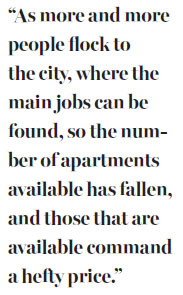People in Beijing, London share same concerns
By Chris Peterson (China Daily Europe) Updated: 2016-04-22 07:10Residents worry about the things we all do in capital cities, especially those who live in a megalopolis
Housing, traffic, the weather, education, pollution - China's burgeoning middle class is as concerned by these topics as their counterparts in any capital city you care to name.
In London, where I live, supper with friends isn't complete without a group moan about the stupidly high cost of housing, worries about education or transportation. (In passing I can't praise London's Tube, train and bus services enough. But that's another story.)
Here in Beijing, the overriding topic is pollution.

Decades of poor planning have meant the winter months in particular have been hellish, with tall buildings sometimes obscured by the smog and most people wearing surgical masks to ward off the worst of the particles.
I've been lucky so far - sunny blue skies and a breeze most of the time has meant that so far I haven't apparently suffered any adverse reaction. But a nighttime shot of China Daily's building showed the newspaper's name in neon lights dimmed by a murky cloud of polluted air.
The colleagues sitting near me in the China Daily office were quick to jump on me when they overheard my telling my wife in a video call that the famed pollution didn't seem to be a problem so far.
"Just you wait and see," they all cried. Another pointed out that one of the most popular smartphone apps was one that forecasts pollution levels.
Well, we'll see.
Evidently the authorities are acutely aware of the problem, because there's a policy of steadily removing smoke-belching factories to less heavily populated provinces. There's a steady shift to carbon-free nuclear power, and the damming of the various mighty rivers is generating hydroelectricity for China's ever-ravenous domestic and manufacturing market.
There is one danger that I hadn't foreseen. Just in the same way that Ho Chi Minh City residents have taken to the motor scooter in droves - last count I saw was close to 3 million machines for a population of well over 9 million - so Beijingers seem to have jumped on the electric bicycle and scooter bandwagon.
They're everywhere, and I swear that one of these days I'm going to be flattened after being hit by one of these things, so silent are they.

They come in all shapes and sizes, from the electric bikes loved by students, the scooters that look just like their petrol-powered counterparts, little food delivery trucks - there are literally hundreds of them around here - and even mini electric-powered rubbish carts.
And all silent. You have to have eyes in the back of your head to navigate the roads and sidewalks.
Property seems to be the other bugbear. As far as I can see, it's the old story of supply and demand. As more and more people flock to the city, where the main jobs can be found, so the number of apartments available has fallen, and those that are available command a hefty price.
I have to say it sounds a bit like London, where there's a desperate need for new housing and what there is commands stupid - and I mean stupid - prices.
According to the World Population Review, current unofficial estimates put Beijing's population at around 22 million. Between 2000 and 2010 it grew by a staggering 44 percent, and current growth rates are around 20 percent per decade.
Let me tell you, you don't need to be an Einstein to figure out that not even the Chinese can construct apartment blocks fast enough to keep pace, although heaven knows they're trying.
Now to the other issue that Beijing shares with London.
The smartphone zombies.
The pavements here are full of masked figures, peering intently at their smartphones, thumbs blurring as they zap out another text message on WeChat, the immensely popular free social media app widely used in China.
I am both an object of pity and silent derision, not because I am a gray-haired, six-foot, 200-pound laowai (foreigner) in a sea of slim, black-haired Chinese, but because my phone is pathetically small.
Most folks here opt for the bigger-screened smartphones, only just short of the size of a small tablet.
I'm ashamed to produce my battered iPhone 4s.
So I'm pitching for an upgrade as soon as I get home.
You see, just as everything else in China, size matters.
The author is managing editor of China Daily Europen Edition, based in London.
Contact the writer at chris@mail.chinadailyuk.com

I’ve lived in China for quite a considerable time including my graduate school years, travelled and worked in a few cities and still choose my destination taking into consideration the density of smog or PM2.5 particulate matter in the region.











